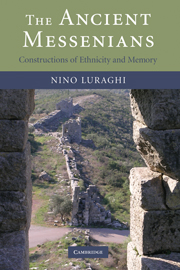Book contents
- Frontmatter
- Contents
- Acknowledgments
- List of abbreviations
- List of illustrations
- Chapter 1 Introduction
- Chapter 2 Delimiting the Messenians
- Chapter 3 The return of the Heraclids and the mythical birth of Messenia
- Chapter 4 The conquest of Messenia through the ages
- Chapter 5 Messenia from the Dark Ages to the Peloponnesian War
- Chapter 6 The Western Messenians
- Chapter 7 The earthquake and the revolt: from Ithome to Naupaktos
- Chapter 8 The liberation of Messene
- Chapter 9 Being Messenian from Philip to Augustus
- Chapter 10 Messenians in the Empire
- Chapter 11 Conclusions
- Bibliography
- Index locorum
- Index of inscriptions
- Archaeological sites
- General index
Chapter 5 - Messenia from the Dark Ages to the Peloponnesian War
Published online by Cambridge University Press: 22 September 2009
- Frontmatter
- Contents
- Acknowledgments
- List of abbreviations
- List of illustrations
- Chapter 1 Introduction
- Chapter 2 Delimiting the Messenians
- Chapter 3 The return of the Heraclids and the mythical birth of Messenia
- Chapter 4 The conquest of Messenia through the ages
- Chapter 5 Messenia from the Dark Ages to the Peloponnesian War
- Chapter 6 The Western Messenians
- Chapter 7 The earthquake and the revolt: from Ithome to Naupaktos
- Chapter 8 The liberation of Messene
- Chapter 9 Being Messenian from Philip to Augustus
- Chapter 10 Messenians in the Empire
- Chapter 11 Conclusions
- Bibliography
- Index locorum
- Index of inscriptions
- Archaeological sites
- General index
Summary
From the scrutiny of the literary evidence on Messenia from the return of the Heraclids to the Spartan conquest conducted in the previous two chapters, two broad conclusions should result in a reasonably uncontroversial way. The first and positive one is that such evidence sheds interesting light on the struggles for the Messenian past – in fact, for the Messenian present – that took place from the moment when, in the second quarter of the fifth century, Spartan domination of the land west of the Taygetos started being called into question. The second and negative one is that it will never be possible to reconstruct the history of Messenia from the eighth century to the sixth in any detail and with any degree of confidence based on the literary evidence. No matter how many details of Pausanias' early history of Messenia derive ultimately from oral traditions handed down for centuries among the inhabitants of Messenia, the amount of observable deformation is such that it is simply impossible, in the absence of contemporary evidence, to isolate supposedly genuine bits from the flow of the story.
A different but related question is what sort of ethnic identity and collective memory we should expect among the inhabitants of Messenia under Spartan rule – a legitimate and extremely interesting question, but one that has often been approached from a rather unhelpful angle.
- Type
- Chapter
- Information
- The Ancient MesseniansConstructions of Ethnicity and Memory, pp. 107 - 146Publisher: Cambridge University PressPrint publication year: 2008

